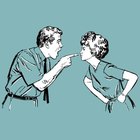
In the beginning stages of a romantic relationship, you may look past some of the faults in the person you're falling for. Those initial butterflies can make it seem as though nothing else matters, which is how some women end up missing the early signs of an abusive and controlling boyfriend. This behavior then escalates and women may find themselves trapped in a relationship that feels very difficult to escape.
Early Signs
Some of the early warning signs of an abuser may be a guy who has a heightened sense of entitlement, is prone to deceit or expresses minor bouts of jealousy, according to author Steven Stosny, in his "Psychology Today" article, “Are You Dating an Abuser?” For instance, your new boyfriend may not want you to spend time with other friends or be especially quick to anger. Perhaps he manipulates you into devoting all your time to him by telling you how afraid he is of losing you or how much you mean to him. He might make abusive, controlling behaviors seem like they stem from protectiveness and true feelings for you rather than flaws in his character.
Escalation of Behavior
Over time, an abusive and controlling man will escalate his behavior to maintain control over you. For example, he may pressure you to limit your time with friends and family, says psychologist Marie Hartwell-Walker in the Psych Central website article, “Signs of a Controlling Guy.” By isolating you, he is able to maintain more control over your behavior. He may involve himself in every aspect of your life. It is also likely that with time, he will chip away at your self esteem by belittling you in order to increase your reliance on him and will accept no responsibility for disagreements. His verbal and emotional abuse will escalate and may also involve physical abuse.
What You May Experience
Women who are in abusive and controlling relationships often begin to withdraw from those closest to them and experience symptoms of depression and anxiety, according to the National Healthy Marriage Resource Center. This can be true whether the abuse is emotional or physical. You may find yourself constantly apologizing for your boyfriend’s behavior and making excuses for how he treats you and others. Your self-esteem falters and you begin to believe this is the treatment you deserve. If there is physical abuse, you may make great efforts to hide your bruises or lie about how you get them to others.
When and Where to Get Help
If your boyfriend displays signs of emotional or physical abuse or controlling behaviors that make you uncomfortable, it is time to get out. Unfortunately, this isn’t always easy for women entrenched in an abusive relationship. The emotional power an abuser has over his victim can be difficult to escape. Talk to friends and family about your desire to leave and allow them to help you, if possible. If you can’t leave right away, identify ways to get out of your home in an emergency and establish code words you can say to friends and family so they can know if you are in immediate danger. For more information on breaking away from an abusive relationship, call the National Domestic Violence Hotline at 1-800-799-7233 (SAFE).
Related Articles

Signs of an Emotionally Abusive Husband

Signs of Verbal Abuse

How to Deal With a Codependent

Signs of a Cheating & Lying Partner

Signs of Emotional Insecurity in a Man

Signs of Jealousy in Men
How to Feel Secure in a Relationship
How to Deal With Jealousy

Signs That You Are Being Mentally ...

How to Fix a Controlling Relationship

Signs That Your Boyfriend Is Not ...

How to Cope With an Arrogant Husband

Warning Signs of an Unhealthy ...

How to Know if You Want to Stay with a ...

How to Make Emotional Connections With ...

How to Know if a Man Has Genuine ...

Symptoms of Being Emotionally ...
What is Emotional Abuse?

What Is Healthy Jealousy?

How to Leave a Verbally Abusive ...
References
Writer Bio
Living in Alaska, Leah Campbell has traveled the world and written extensively on topics relating to infertility, dating, adoption and parenting. She recently released her first book, and holds a psychology degree (with an emphasis in child development and abnormal child psychology) from San Diego State University.
Photo Credits
gpointstudio/iStock/Getty Images